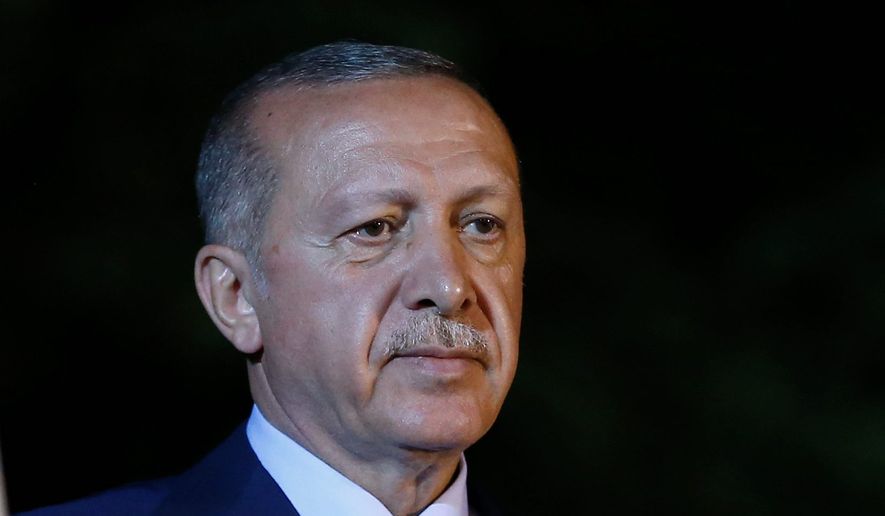Fresh from a successful re-election campaign, Turkish President Recep Tayyip Erdogan’s government is flexing its newfound clout in the fight on Capitol Hill over acquiring cutting-edge U.S. military hardware.
Officials in Ankara claim they have secured concessions from the Trump White House that Washington will push forward with planned sales of the F-35 Joint Strike Fighter to the country, despite significant resistance from some powerful voices in Congress.
“We discussed the F-35 issue with Trump and he promised to look into it and take all the necessary steps,” to ensure the foreign military sale goes forward, Turkish Foreign Minister Mevlut Cavusoglu said in an interview over the weekend.
“Since his inauguration, Trump has aimed to develop ties with Turkey,” Mr. Cavusoglu told Turkish news outlet NTV. The 10-plane, $100 billion F-35 deal was reached between Turkey and the U.S. in 2002.
“Despite a few unpleasant reactions coming from the U.S. Senate, there have been no problems regarding the F-35 so far,” he said, less than a week after Mr. Erdogan and the ruling political party he leads secured victory in the country’s first-ever parallel presidential and parliamentary elections.
The May referendum vote dramatically expanded Mr. Erdogan’s presidential powers and making the longtime leader eligible for two new, five-year terms as president.
Mr. Erdogan’s government is wasting no time leveraging that newfound political clout in Washington. Angered over Turkey’s plans to field Russian-built S-400 missile defense systems, U.S. lawmakers are trying to quash the multimillion dollar jet fighter deal with Ankara.
Opponents of the S-400 deal inside and outside the Pentagon deal say Ankara’s decision to purchase the Russian-made anti-aircraft missile system will draw Turkey deeper into the Kremlin’s growing sphere of influence in the Middle East.
The move would also reducing military interoperability between Turkey and its NATO partners, and provide Moscow with significant insight into the inner workings of the F-35 operations, one of Washington’s closely guarded military secrets.
Legislative language blocking the F-35 deal was adopted in the Senate version of the Pentagon’s spending bill for the coming fiscal year, but House lawmakers declined including the language in their version of the bill.
Defense Department officials said Monday the Trump administration has yet to issue any guidance on Turkey’s future in the F-35 program and is proceeding with plans to outfit Ankara’s forces with the stealth fighter.
“The U.S. government has not made a determination on Turkey’s future participation in the F-35 Joint Strike Fighter program,” Pentagon spokesman Army Col. Rob Manning told reporters, noting the first two F-35 fighters tapped for Turkish forces had arrived at Luke Air Force Base in Arizona for training.
Turkish aviators will begin flight training aboard the stealthy jet fighters next month at the U.S. air base, while the actual aircraft will remain under American custody until the end of the two-year training cycle, Air Force officials said.
Mr. Cavusoglu said congressional concern over the S-400 sale was misguided, noting Ankara only proceeded with the Russian arms deal after NATO members declined to sell the air defense systems fielded by alliance members to Turkey. Mr. Erdogan’s military ties with the U.S. and NATO had been hanging by a thread in the months running up to the June elections.
U.S.-Turkish relations have been strained in particular by U.S. forces’ continued collaboration with Kurdish military units fighting Islamic State and other jihadi forces across the board in Syria. Turkey has long battled a violent domestic Kurdish separatist movement and fears the Syria Kurds could be seeking a state of their own some day.
U.S. forces continue to train and equip Syrian Kurdish forces in the strategic Syrian town of Manbij. Turkey has labeled the Kurdish U.S. allies terrorists.
The Trump administration has tried to tamp down tensions with Ankara, striking a deal to withdraw Kurdish elements from Manbij and announcing Turkish and U.S. patrols in the area.
President Trump called Mr. Erdogan to congratulate him on his victory in the June 24 national vote, but the White House has declined to give a read-out on what the two leaders discussed.
• Carlo Muñoz can be reached at cmunoz@washingtontimes.com.




Please read our comment policy before commenting.